Unit 12 What did you do last week Section B 1a-1d 课件(共25张PPT,内嵌音频) 2022-2023学年人教版七年级英语下册
文档属性
| 名称 | Unit 12 What did you do last week Section B 1a-1d 课件(共25张PPT,内嵌音频) 2022-2023学年人教版七年级英语下册 | 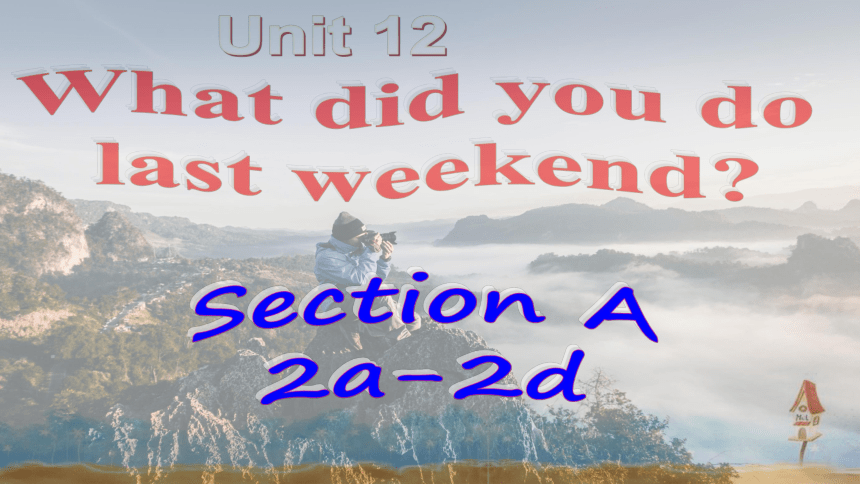 | |
| 格式 | pptx | ||
| 文件大小 | 4.9MB | ||
| 资源类型 | 教案 | ||
| 版本资源 | 人教新目标(Go for it)版 | ||
| 科目 | 英语 | ||
| 更新时间 | 2023-06-04 16:08:38 | ||
图片预览

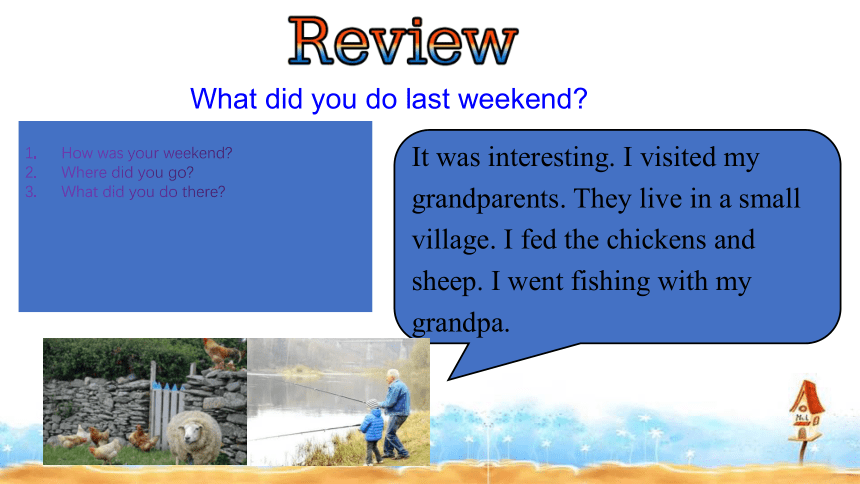
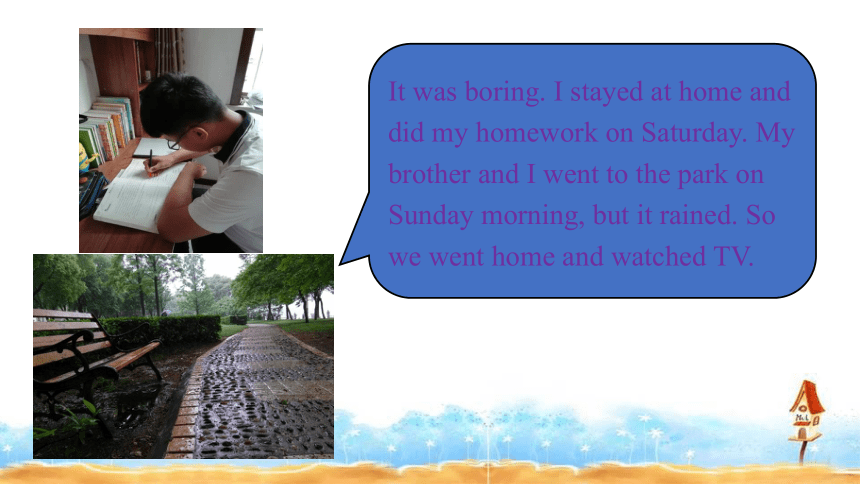
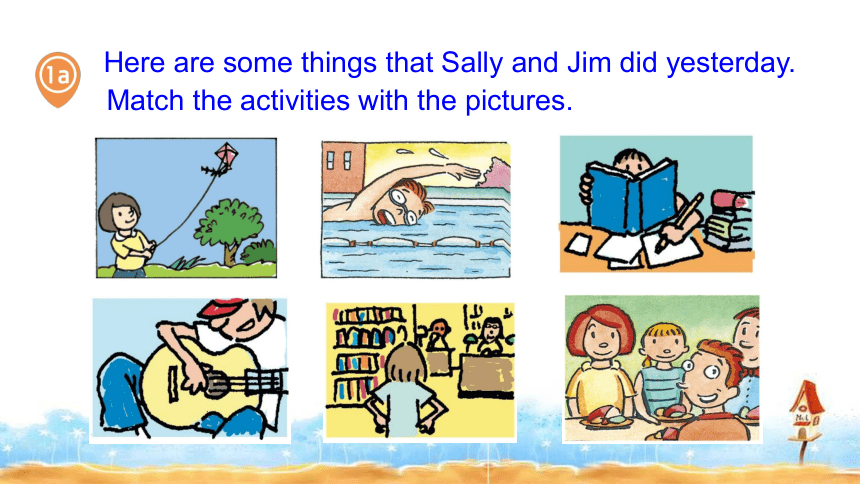
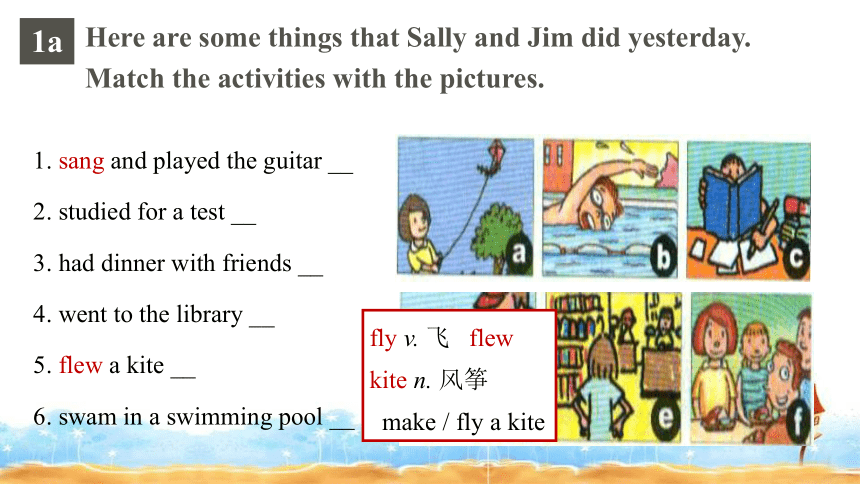
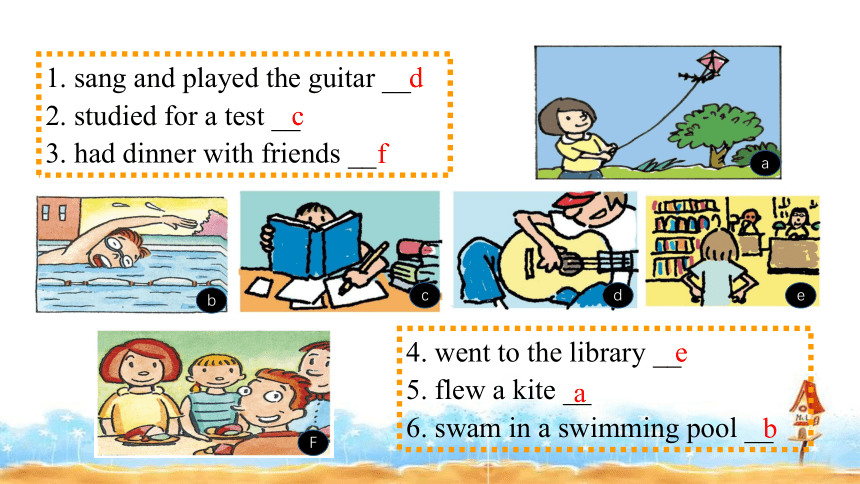
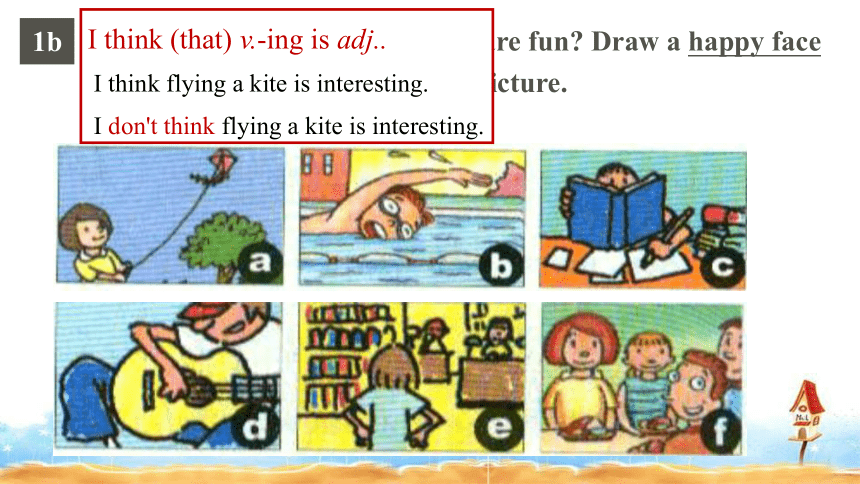
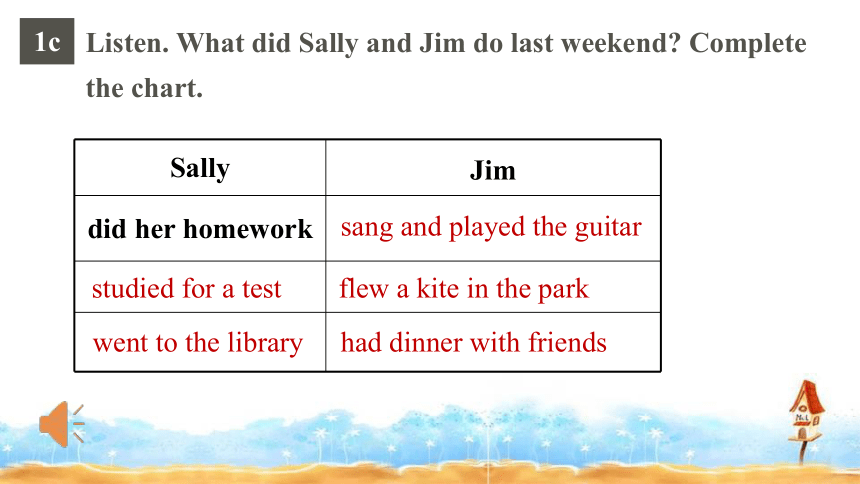
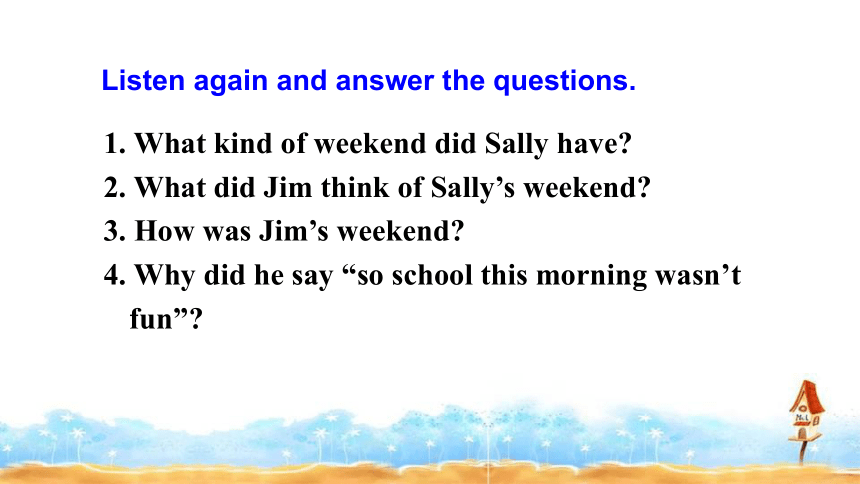
文档简介
(共25张PPT)
What did you do
last weekend
Unit 12
Section A
2a-2d
It was interesting. I visited my grandparents. They live in a small village. I fed the chickens and sheep. I went fishing with my grandpa.
What did you do last weekend
How was your weekend
Where did you go
What did you do there
It was boring. I stayed at home and did my homework on Saturday. My brother and I went to the park on Sunday morning, but it rained. So we went home and watched TV.
Here are some things that Sally and Jim did yesterday. Match the activities with the pictures.
1a
Here are some things that Sally and Jim did yesterday. Match the activities with the pictures.
1. sang and played the guitar __
2. studied for a test __
3. had dinner with friends __
4. went to the library __
5. flew a kite __
6. swam in a swimming pool __
fly v. 飞 flew
kite n. 风筝
make / fly a kite
1. sang and played the guitar __
2. studied for a test __
3. had dinner with friends __
d
f
c
4. went to the library __
5. flew a kite __
6. swam in a swimming pool __
a
b
e
a
b
c
d
e
F
1b
Do you think the activities in 1a are fun Draw a happy face or an unhappy face under each picture.
I think (that) v.-ing is adj..
I think flying a kite is interesting.
I don't think flying a kite is interesting.
Listen. What did Sally and Jim do last weekend Complete the chart.
Sally Jim
did her homework
studied for a test
went to the library
sang and played the guitar
flew a kite in the park
had dinner with friends
1c
Listen again and answer the questions.
1. What kind of weekend did Sally have
2. What did Jim think of Sally’s weekend
3. How was Jim’s weekend
4. Why did he say “so school this morning wasn’t fun”
Listen again and fill in the blanks.
Jim: Hey, Sally! I __________ you last weekend.
Sally: Yeah. I ____________ home on Saturday. I was quite busy.
Jim: Why
Sally: I _______ a lot of things ________.
Jim: Like what
Sally: Well, I ______ my homework and ________ for a test.
Jim: You did Not much fun, huh
didn’t see
stayed at
had
to do
did
studied
Sally: Well, it wasn’t too bad. On Sunday, I _________ the library. How about you Did you go out
Jim: Well, I _______ and ________ the guitar on Saturday morning. On Sunday afternoon, I __________________. And on Sunday night, I __________ with my friends.
Sally: Wow! You had a relaxing time!
Jim: Yeah, I ___________. But I didn’t do my homework, so school this morning ___________!
went to
sang
played
flew a kite in the park
had dinner
had fun
wasn’t fun
1d
Make a conversation with a partner. Talk about what Sally and Jim did last weekend.
Sally: Good morning, Jim! How was your last weekend
Did you do anything interesting last weekend
Jim: It's adj.. / Yes .... / No ....
Sally: Did you v. ...
Where did you v. ...
What did you v. ...
Jim: .... What about you
anything interesting
any interesting thing
Make a conversation with a partner. Talk about what Sally and Jim did last weekend.
Who went to the library
Sally did.
Did Sally go out on Saturday
No, she didn’t. She did her homework and studied for a test.
Then what did she do on Sunday
She went to the library.
It was relaxing.
Well. He sang and played the guitar on Saturday morning.
How was Jim’s last weekend
Really What did he do on Saturday
What did he do on Sunday
…
Language points
As a special gift, our parents took us to India.
作为一份特殊的礼物, 我爸妈带着我们去了印度。
1) 此处介词as 表示“作为……; 当作……”,其后可以接职业,用途,特点等。用在句首时,这种短语的后面往往有逗号与语句的主体隔开。例如:
As a student, I must work hard.
作为一名学生,我必须努力学习。
2) 本句中动词take 表示“带领”,take … to …则表示“带领某人去某处”。例如:
On Sundays, the father would take his son to the park.
一到星期天,爸爸便会带他的儿子去公园。
辨析: bring, take, carry, fetch
bring 意为“拿来,带来”,表示“拿到靠说话人近的地方”。
take 意为“拿走,带走”,表示“拿到远离说话人远的地方”。
carry 意为“扛,搬”,用力移动,没有方向性。
fetch 意为“去取,去拿”表示往返拿物。
The Young Pioneer ______ water for the old man every day.
A. fetches B. brings C. takes D. carries
答案:选D。
bring从远处把某物拿到跟前;take…(with)随身带上某物,即物就在旁边;通过用力搬运、扛、抬等,那是carry的能力范围;fetch去把某物拿来,强调的是“去、回”双线行为。
2. There we put up tents and made a fire to keep us warm and cook food on.
在那里我们架起帐篷,生火取暖并做饭。
1) 动宾短语表达法:put up tents 搭建帐篷; make a fire 生火;keep us warm 使得我们暖和;cook food on the fire 在火上做饭
2) 本句的主体部分是we put up tents and made a fire, 后续的 to keep us warm and cook food on (it) 表达的是made a fire 的目的。句尾介词“on” 后有所省略,以避免重复。
3. On the first night, … 在头一天夜里,……
英语中表示一天中的时间分别采用at night (在夜里)、in the morning (在上午)、in the evening (在下午)等,但表示“在某一天上午、下午或晚上等”的特定时间,往往使用介词on。例如:
On the early morning of November 20th, we got a special postcard.
在11月20号一大清早,我们收到了一张特殊的明信片。
4. But I was so tired that I went to sleep early. 但是我太累了,所以早早就睡着了。
I was so scared that I couldn’t move.
我是那么害怕,一动都不敢动。
英语中 “so +形容词+that 句子”,表示“太……以至于……”。例如:
The game is so interesting that I don’t want to stop playing it. 这个游戏是如此有意思,以至于我都不想停下来。
The soup was so delicious that he drank it up. 汤是那么好喝,于是他喝了个精光。
辨析 so that / so… that
so that引导目的状语从句时,表示“以便;为了”。例如:
I got up early so that I could catch the early bus.
我早起是为了搭乘早班车。
2) so +形容词或副词+ that ...引导结果状语从句,意思是“如此……以致于……”。例如:
He runs so fast that nobody can catch up with him.
他跑得非常快,没人能追上他。
Did you do anything interesting last weekend
Make a conversation. Ask what your partner did last weekend.
Not really, but I visited my sister.
课堂小结
Sally
Jim
stayed at home
did homework
sang and played the guitar
went to the library
studied for a test
flew a kite in the park
had dinner with friends
What did Sally and Jim do last weekend
Make conversations by using the above information.
听录音,模仿1c听力材料,并能用自然的语音语调复述对话。
2. 把小组汇报的结果再充实整理后写在作文本上。
家庭作业
Thanks!
What did you do
last weekend
Unit 12
Section A
2a-2d
It was interesting. I visited my grandparents. They live in a small village. I fed the chickens and sheep. I went fishing with my grandpa.
What did you do last weekend
How was your weekend
Where did you go
What did you do there
It was boring. I stayed at home and did my homework on Saturday. My brother and I went to the park on Sunday morning, but it rained. So we went home and watched TV.
Here are some things that Sally and Jim did yesterday. Match the activities with the pictures.
1a
Here are some things that Sally and Jim did yesterday. Match the activities with the pictures.
1. sang and played the guitar __
2. studied for a test __
3. had dinner with friends __
4. went to the library __
5. flew a kite __
6. swam in a swimming pool __
fly v. 飞 flew
kite n. 风筝
make / fly a kite
1. sang and played the guitar __
2. studied for a test __
3. had dinner with friends __
d
f
c
4. went to the library __
5. flew a kite __
6. swam in a swimming pool __
a
b
e
a
b
c
d
e
F
1b
Do you think the activities in 1a are fun Draw a happy face or an unhappy face under each picture.
I think (that) v.-ing is adj..
I think flying a kite is interesting.
I don't think flying a kite is interesting.
Listen. What did Sally and Jim do last weekend Complete the chart.
Sally Jim
did her homework
studied for a test
went to the library
sang and played the guitar
flew a kite in the park
had dinner with friends
1c
Listen again and answer the questions.
1. What kind of weekend did Sally have
2. What did Jim think of Sally’s weekend
3. How was Jim’s weekend
4. Why did he say “so school this morning wasn’t fun”
Listen again and fill in the blanks.
Jim: Hey, Sally! I __________ you last weekend.
Sally: Yeah. I ____________ home on Saturday. I was quite busy.
Jim: Why
Sally: I _______ a lot of things ________.
Jim: Like what
Sally: Well, I ______ my homework and ________ for a test.
Jim: You did Not much fun, huh
didn’t see
stayed at
had
to do
did
studied
Sally: Well, it wasn’t too bad. On Sunday, I _________ the library. How about you Did you go out
Jim: Well, I _______ and ________ the guitar on Saturday morning. On Sunday afternoon, I __________________. And on Sunday night, I __________ with my friends.
Sally: Wow! You had a relaxing time!
Jim: Yeah, I ___________. But I didn’t do my homework, so school this morning ___________!
went to
sang
played
flew a kite in the park
had dinner
had fun
wasn’t fun
1d
Make a conversation with a partner. Talk about what Sally and Jim did last weekend.
Sally: Good morning, Jim! How was your last weekend
Did you do anything interesting last weekend
Jim: It's adj.. / Yes .... / No ....
Sally: Did you v. ...
Where did you v. ...
What did you v. ...
Jim: .... What about you
anything interesting
any interesting thing
Make a conversation with a partner. Talk about what Sally and Jim did last weekend.
Who went to the library
Sally did.
Did Sally go out on Saturday
No, she didn’t. She did her homework and studied for a test.
Then what did she do on Sunday
She went to the library.
It was relaxing.
Well. He sang and played the guitar on Saturday morning.
How was Jim’s last weekend
Really What did he do on Saturday
What did he do on Sunday
…
Language points
As a special gift, our parents took us to India.
作为一份特殊的礼物, 我爸妈带着我们去了印度。
1) 此处介词as 表示“作为……; 当作……”,其后可以接职业,用途,特点等。用在句首时,这种短语的后面往往有逗号与语句的主体隔开。例如:
As a student, I must work hard.
作为一名学生,我必须努力学习。
2) 本句中动词take 表示“带领”,take … to …则表示“带领某人去某处”。例如:
On Sundays, the father would take his son to the park.
一到星期天,爸爸便会带他的儿子去公园。
辨析: bring, take, carry, fetch
bring 意为“拿来,带来”,表示“拿到靠说话人近的地方”。
take 意为“拿走,带走”,表示“拿到远离说话人远的地方”。
carry 意为“扛,搬”,用力移动,没有方向性。
fetch 意为“去取,去拿”表示往返拿物。
The Young Pioneer ______ water for the old man every day.
A. fetches B. brings C. takes D. carries
答案:选D。
bring从远处把某物拿到跟前;take…(with)随身带上某物,即物就在旁边;通过用力搬运、扛、抬等,那是carry的能力范围;fetch去把某物拿来,强调的是“去、回”双线行为。
2. There we put up tents and made a fire to keep us warm and cook food on.
在那里我们架起帐篷,生火取暖并做饭。
1) 动宾短语表达法:put up tents 搭建帐篷; make a fire 生火;keep us warm 使得我们暖和;cook food on the fire 在火上做饭
2) 本句的主体部分是we put up tents and made a fire, 后续的 to keep us warm and cook food on (it) 表达的是made a fire 的目的。句尾介词“on” 后有所省略,以避免重复。
3. On the first night, … 在头一天夜里,……
英语中表示一天中的时间分别采用at night (在夜里)、in the morning (在上午)、in the evening (在下午)等,但表示“在某一天上午、下午或晚上等”的特定时间,往往使用介词on。例如:
On the early morning of November 20th, we got a special postcard.
在11月20号一大清早,我们收到了一张特殊的明信片。
4. But I was so tired that I went to sleep early. 但是我太累了,所以早早就睡着了。
I was so scared that I couldn’t move.
我是那么害怕,一动都不敢动。
英语中 “so +形容词+that 句子”,表示“太……以至于……”。例如:
The game is so interesting that I don’t want to stop playing it. 这个游戏是如此有意思,以至于我都不想停下来。
The soup was so delicious that he drank it up. 汤是那么好喝,于是他喝了个精光。
辨析 so that / so… that
so that引导目的状语从句时,表示“以便;为了”。例如:
I got up early so that I could catch the early bus.
我早起是为了搭乘早班车。
2) so +形容词或副词+ that ...引导结果状语从句,意思是“如此……以致于……”。例如:
He runs so fast that nobody can catch up with him.
他跑得非常快,没人能追上他。
Did you do anything interesting last weekend
Make a conversation. Ask what your partner did last weekend.
Not really, but I visited my sister.
课堂小结
Sally
Jim
stayed at home
did homework
sang and played the guitar
went to the library
studied for a test
flew a kite in the park
had dinner with friends
What did Sally and Jim do last weekend
Make conversations by using the above information.
听录音,模仿1c听力材料,并能用自然的语音语调复述对话。
2. 把小组汇报的结果再充实整理后写在作文本上。
家庭作业
Thanks!
同课章节目录
- Unit 1 Can you play the guitar?
- Section A
- Section B
- Unit 2 What time do you go to school?
- Section A
- Section B
- Unit 3 How do you get to school?
- Section A
- Section B
- Unit 4 Don't eat in class.
- Section A
- Section B
- Unit 5 Why do you like pandas?
- Section A
- Section B
- Unit 6 I'm watching TV.
- Section A
- Section B
- Review of Units 1-6
- Unit 7 It's raining!
- Section A
- Section B
- Unit 8 Is there a post office near here?
- Section A
- Section B
- Unit 9 What does he look like?
- Section A
- Section B
- Unit 10 I'd like some noodles.
- Section A
- Section B
- Unit 11 How was your school trip?
- Section A
- Section B
- Unit 12 What did you do last weekend?
- Section A
- Section B
